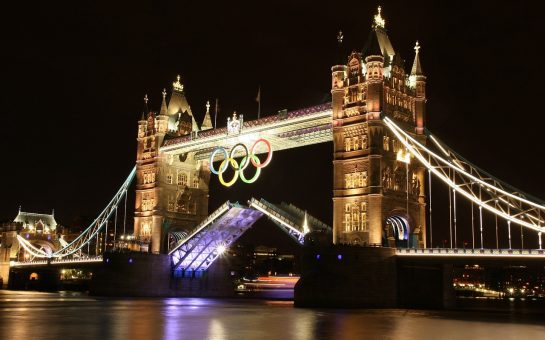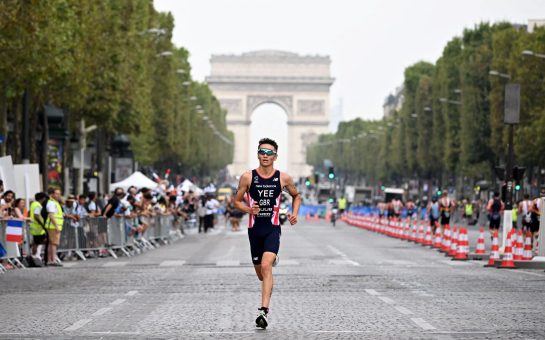Atlanta’s Olympic Stadium had descended into the hush that marks the moments immediately prior to athletics’ grandest occasions.
Roger Black was waiting for the bang of the starter’s gun — he knew that piercing blast would herald the explosion of flashlight that greets runners as they unfurl into their first stride.
Black was aiming to become the first Brit competing in his event to stand on an Olympic podium for 60 years. And he oozed calm.
No matter what, within 45 seconds he would discover if it had all been worth it. If the hours, weeks and years of flogging his body would reap the one prize he craved.
Black was settled into his blocks for the men’s 400m final at the 1996 Olympic Games.
“I was as prepared and ready as I’d been in my whole career,” he said.
“I had comfortably won my semi-final. This was something I’d done time and time again.
“I’d done the event in my head throughout the season. I just knew that if I was ahead with 100m left to run then nobody, with the exception of Michael, would be able to get past me.”
Michael is Michael Johnson — the athlete of those games — one of the best athletes of this or any other generation.
Johnson ate up the Atlanta track in that 400m final — whose 20th anniversary falls one week before the August 5 opening ceremony for this year’s Games in Rio.
The man with the idiosyncratic, upright gait covered one lap in 43.49 seconds — it remains the fastest time run over the distance in Olympic competition.
The American’s run was as predictable as it was remarkable. On the dawn of his biggest day, then, Black had accepted he would be confronted with a unique situation.
This was two races in one: Johnson versus the clock and the Texan’s ‘rivals’ fighting to be best of the rest.
And Black was in the form of his life.
“With experience you know when you’re in good shape,” he said.
“I knew that, on my day, I was capable of beating most of the guys in the world. And I knew that it was my last chance to win an Olympic medal. There was pressure.”
Black travelled to America a two-time individual European champion. A decade previously he was a Commonwealth Games gold medallist.
As he explains though, when discussing British one-lap contemporaries Mark Richardson and Iwan Thomas, the challenge of Olympic competition is a world removed from that encountered when the field is restricted to European or Commonwealth athletes.
“It is extremely difficult to run fast times and to win medals,” says Black. “It is just a very difficult thing.
“They [Richardson and Thomas] had times and ability on paper, but they would be the first to tell you that translating that into major medal is very, very difficult.
“Being competitive in World Championships and Olympics is entirely different to doing well at Europeans and Commonwealths.”
Injuries had prevented Black from attaining the condition required to be a medal contender at the 1992 Olympic Games.
The timing of his hamstring problem 24 years ago was particularly off, given that the Portsmouth-born runner had claimed silver at the World Championships 12 months earlier.
Black was eliminated at the semi-final stage in Barcelona and the following year in 1993 he was struck down by the debilitating Epstein-Barr virus. He wondered if he was finished at 27.
Those worst fears were dispelled across a painstaking recovery period, which included six months spent at the Australian Institute of Sport in Canberra.
His health renewed, Black, who was last year inducted into the England Athletics Hall of Fame, realised that he had one more chance to get his hands on the Olympic bullion he holds in such esteem.
By the time 1996 came around everything was in working order. Black ran a personal best of 44.39 to win the AAA title in Birmingham in June.
On 3 July 1996, running in Switzerland’s Lausanne Grand Prix, he shaved another 0.02 seconds off that time in finishing second behind the incomparable Johnson.
It was an outcome that would be replicated in the biggest race of all 26 days later in Atlanta.
The intervening period, however, with all its scope for knocking Black’s tranquil progress off track, was testing.
“I wasn’t wanting to train,” he said. “I was absolutely focused on just staying healthy. I had to capitalise on my momentum. It was in my hands. I hadn’t run badly all year.
“But the Olympics is a very different challenge. It’s four races inside a week. I knew three or four guys might be capable of running faster on the day, but I always rose to this type of challenge.”
He was as good as his word. Entering the final straight in the fight for medals only one man was ahead of him —Johnson, gliding serenely along, adorned in his golden Nike running spikes.
Black was winning his race. He didn’t tighten once. Nobody was passing him.
Asked if those 44.41 seconds propelled him into an exclusive sphere, the preserve of athletes who scale the summit of their sport, Black said: “Yes they did. Everyone in the world knows the significance of an Olympic medal. It’s the Olympics. It’s history.
“In terms of the guys you run against it’s no different, in essence, from a World Championships. But there is something about an Olympics that sets it apart.”
Does he ever wish that he could have had a proper shot at gold in a Johnson-free world, in much the same fashion that in Andy Murray’s quieter moments the British tennis star must rue being born into the same era as the imperious Novak Djokovic?
“Absolutely not,” comes the reply. “I will always be intrinsically linked with Michael. I was on the podium with him — and we were both experiencing exactly the same feeling.”
Black says the enormity of his achievement 20 years ago is best illustrated by the fact that no British male 400m runner has secured Olympic hardware since.
“I am as proud of that as anything,” he says.
“It’s a big deal. And I was the first to do it for 60 years [Godfrey Brown won 400m silver in Berlin in 1936]. Before that it was Chariots of Fire time.
“I’m so grateful that I can talk to you as the last British male 400m runner to stand on the podium at an Olympics.”
But how does he envisage the current crop of British runners, and in particular 2014 European champion Martyn Rooney and the talented Matthew Hudson-Smith, faring in Rio in August?
“They are very talented, but neither of them will win a medal,” says Black. If either of them reaches the final, then that would be a fabulous achievement.”
And Black thinks he knows why Britain has proved a relative wasteland for one-lap runners since our halcyon days in the 1990s.
“It is a very difficult, physical experience,” he said. “The 400m requires so much dedication. It takes so much out of you.”
As if to emphasise that point, Hudson-Smith has his fingers crossed that he is through an injury plagued period, which included the 21-year-old sustaining three stress fractures in his back last summer.
With that in mind, will Black, who now runs a motivational speaking business alongside fellow former-British Olympian Steve Backley, be watching on longingly, envious of today’s competitors, when this year’s 400m showpiece is underway? Or is he happy to be free of all its associated demands?
Black considers the question for a good few seconds, before saying: “I could give you the Hollywood answer and say I’d love to still be running and competing.
“But it’s too hard. So hard. I wouldn’t want to experience that again. I’m not greedy. I’ve had my moment.
“I will never forget how hard it was. I would never underestimate how difficult it is to train for and compete at an Olympics.
“I’ll enjoy being at home, watching it on my TV, sat there saying ‘wow’.
“The medals will be won in similar times to those we were running 20 years ago. There are three guys capable of breaking 44 seconds, but 44.4 will nearly always nick a medal [it has in the past five Olympics].”
Those three men who all crossed the line in sub-44 second times at last year’s World Championships in China are defending Olympic champion Kirani James, the 23-year-old from Grenada and winner of Olympic gold in Beijing in 2008, American LaShawn Merritt, six years James’ senior – and world athletics’ coming man Wayde Van Niekerk.
South African Van Niekerk took gold at last year’s global championships in Beijing. He promptly left the Bird’s Nest Stadium in an ambulance stricken with exhaustion.
The 23-year-old subsequently confirmed his arrival as a genuine star of track and field by running the 100m in 9.98 seconds in a meeting in his home country, in the process becoming the first man ever to dip under 10 seconds, 20 seconds and 44 seconds in the 100m 200m and 400m respectively.
Van Niekerk’s sub-10 second run in Bloemfontein in March convinced Black that the man from Cape Town holds all the aces going to Rio.
“He’s new to the game and he’s in terrific shape,” says Black. “If he’s hitting his stride at the right time I think he’ll win it.”
For all his accomplishments to date, Olympic glory would change Van Niekerk’s life forever. Roger Black, after all, is still being asked, 20 years on, to relive his career defining day.
Image courtesy of TJS Sport via YouTube, with thanks




